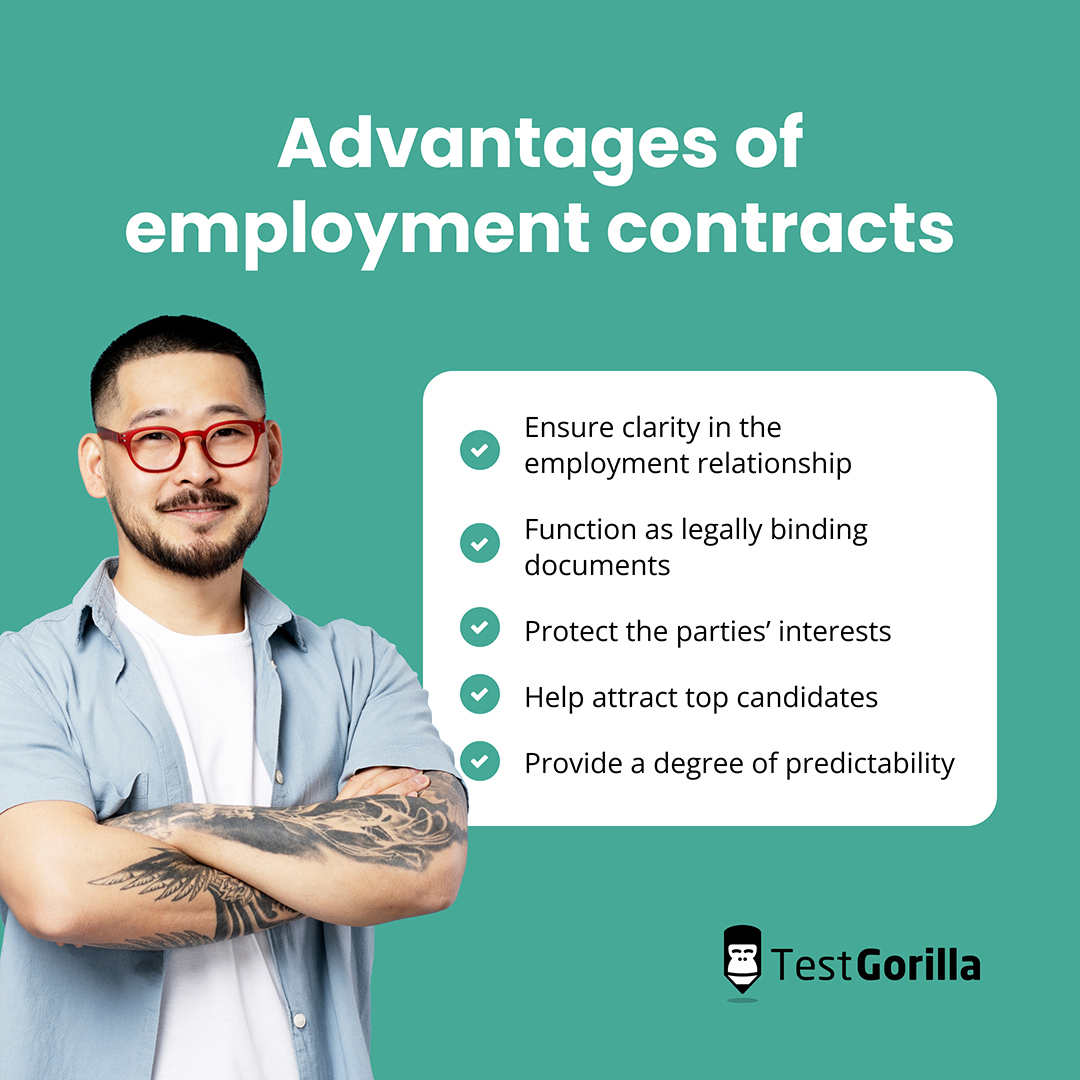Many businesses use written employment contracts, especially for executive and managerial roles. However, due to the various, ever-evolving laws and regulations that apply to these contracts, handling them for your organization can feel overwhelming.
Written employment contracts aren’t always necessary. When you do use them, it can be tough to know what to include and what not to include. And making a mistake can be costly for your organization, opening it up to employee lawsuits.
In this article, we take a closer look at the terms and clauses to include in written employment contracts, as well as reasons for and against using them.
Table of contents
- What is employment contract law?
- What’s included in an employment contract?
- What shouldn’t be included in an employment contract?
- Does employment contract law differ for each state?
- Advantages of employment contracts
- Disadvantages of employment contracts
- Do I need an attorney to review my employment contracts?
- Ensure you want to use an employment contract with pre-employment testing
What is employment contract law?
Employment contract law refers to the legal principles and rules that apply to employment contracts. You must follow these if you want your contracts to be valid.
An employment contract is an agreement between a business and an employee that outlines the key terms of the relationship. It identifies the responsibilities and rights of both parties and provides a basis for legal action if someone fails to perform their duties. These contracts are often formal written documents signed by both the employer and the employee.
Businesses aren’t legally required to use employment contracts in the US, but many do.
But navigating employment contract law can be difficult. There are rules at the federal, state, and local levels that can apply simultaneously.
To further complicate this, there are different types of employment contracts, including fixed-term, permanent, casual, and at-will. While fixed-term contracts have a specified end date, permanent contracts don’t. Casual contracts offer flexible schedules and don’t promise a minimum amount of work. Under an at-will contract, either party can end the contract at any time for any lawful reason or without reason.
No matter which types of contracts you use in your HR department, you’ll need to familiarize yourself with employment contract law. This way, your HR team can learn how to create, interpret, and enforce your contracts in accordance with legal principles and rules.
Keep in mind that, in addition to contract law, you also must be aware of the state and federal employment laws that apply to your organization.
What’s included in an employment contract?
The inclusions in an employment contract vary depending on the location of the business and employee, the nature of the business and the employee’s role, and the details of the specific employment relationship.
Here are some common issues that employment contracts address:
Dates of employment. For fixed-term contracts, these include the start and end dates. Ongoing, permanent contracts don’t have end dates.
Employee’s job title and duties. This section outlines the role’s key responsibilities.
Compensation. This section usually details the salary or pay, payment frequency, payment method, and additional compensation – such as overtime pay (for eligible employees), equity, commissions, or bonuses.
Benefits. This section specifies all the benefits the employee is entitled to, including vacation and sick leave, health insurance, and retirement benefit plans.
Hours. In this section, you can specify whether the employee is full-time or part-time and the days and hours they’re required to work. You may also want to state the principal place of employment or whether the job involves remote work.
Probationary or trial period. Some employees may undergo an initial period of probation. During this period, you can assess the employee’s skills, performance, and overall fit within your company. Most probation or trial periods are between three and six months. Should either party want to terminate the relationship during this time, shorter notice periods usually apply.
Termination. This section explains how your organization or the employee can end the contract, including required notice periods and severance pay.
Dispute resolution. These clauses usually state that in case of a disagreement, your organization and the employee must try alternative dispute resolution methods like – arbitration or mediation – before going to court. Arbitrators and mediators are neutral third parties that help both sides come to an agreement.
Non-solicitation agreement. These agreements prevent employees from taking your organization’s clients, other employees, contractors, or suppliers when they leave.
Non-compete agreement. This clause restricts an employee from accepting another job or starting a business in direct competition with your organization within a specific time and geographic area. Learn more about its pros and cons.
Non-disclosure or confidentiality agreement. This clause prevents employees from sharing confidential company information, such as trade secrets, strategies, and financial information.
What shouldn’t be included in an employment contract?
An employment contract should avoid terms or clauses that are unlawful, fraudulent, or unfair.
For example:
Should your state law require your organization to provide paid annual leave, including a clause that denies an employee this benefit is unlawful.
You can’t ask the employee to do something illegal in the contract – for example, when describing their job duties.
Don’t promise an employee something – like specific pay or benefits – when you know you can’t fulfill the promise. This can amount to fraud.
A clause requiring the employee to pay a large amount of money if they leave your company within a specific time frame is generally considered unfair.
Including terms like these may make the contract unenforceable and lead to other legal consequences, such as lawsuits.
Does employment contract law differ for each state?
The laws that apply to different elements of the employment contract – including severance pay, minimum wages, leave entitlements, and workers’ compensation – vary between states.
For instance:
The minimum wage in California is $15.50 an hour, while Georgia’s is $5.15 an hour.
In Ohio, employers must pay employees at least twice a month. In Florida, however, employers can set their own pay frequency.
California employees are entitled to at least 24 hours of annual paid sick leave, while employers don’t have to offer paid sick leave in Tennessee.
This can get especially complicated if your business is located in one state and the employee in another or if the employee works between two states. There are also various laws relating to employment contracts at the federal and municipal levels. As a result, multiple laws may apply to your business and affect the way you prepare employment contracts.
It’s important to check which laws apply to your business before preparing an employment contract so you don’t get anything wrong. Some organizations have staff qualified in employment law to handle this. Alternatively, you may want to engage an employment attorney.
Advantages of employment contracts
Although employers aren’t legally required to use written employment contracts, many do for some of the following reasons.
1. Ensure clarity in the employment relationship
An employment contract sets out the specific details that define the relationship between your organization and the employee. It outlines the expectations of both parties, including what the employee’s primary duties are and what your organization will provide them in return.
This reduces the risk of disagreements between your organization and the employee. Should one arise, you can refer to the contract for clarification without resorting to costly legal action.
2. Function as legally binding documents
An effectively drafted contract is a legally binding document. When either your organization or the employee doesn’t uphold their end of the agreement, the contract provides the other party with a legal basis to pursue a remedy. Your HR team can take disciplinary actions or terminate employees based on the contract, while employees can take legal action, like suing for breach of contract or wrongful termination, if necessary.
3. Protect the parties’ interests
Well-written employment contracts protect both your organization's and employee’s interests. For example, your company can protect its intellectual property by including a confidentiality agreement. An employment contract also helps ensure employees receive the hours, compensation, and other benefits your organization has promised them.
4. Help attract top candidates
Many candidates value the certainty and job security that a formal contract provides. When other employers in your industry are offering employment contracts and your HR department isn’t, you risk losing out on attracting top talent.
5. Provide a degree of predictability
Written employment contracts add a level of predictability to the working relationship. Both parties know what to expect in terms of contract length and can plan accordingly. This is especially useful for your HR team, as you can budget and plan for employee wages, leave, and other benefits.
Disadvantages of employment contracts
Depending on the circumstances, you may decide a written employment contract isn’t necessary, especially if the disadvantages outweigh the advantages.
1. Limit flexibility
Once the parties have signed a contract, it’s difficult to change it. Should either party want to alter a part of the contract, they’ll have to renegotiate with the other party. There’s no guarantee that the other party will agree to the suggested changes.
2. Make termination more difficult
If your organization wants to end an employment contract, you must comply with the relevant terms, including the reasons for termination and notice periods. This can limit your company’s ability to quickly adapt the workforce to changing business needs.
This limitation is especially relevant in many states where the law considers uncontracted workers to be at-will employees by default. This is because a contract often sets extra rules the employer has to follow before ending employment. Some employers might prefer for their employees to remain at-will employees so termination is easier.
3. Cost time and money
Employment contract law is a complex area of law, and it takes time to prepare proper employment contracts. You need someone with specialist contract skills to review them and confirm they’re valid. You can do this in-house or with an external attorney, which can be costly.
4. Impose an obligation to act in good faith and fair dealing
Employment contracts come with an implied obligation called the covenant of good faith and fair dealing. Acting in good faith requires each party to not intentionally obstruct the other from performing their duties under the contract. This includes acting reasonably and honestly towards each other throughout the employment relationship. Should either party breach this covenant, they may face legal action.
The covenant applies to all aspects of the employment relationship. For example, if you make up reasons to terminate an employee so you can hire a younger candidate and pay them less, this would breach the good faith and fair dealing covenant.
Do I need an attorney to review my employment contracts?
Employment contract law is complicated and varies between states. There are also overlapping federal laws and local regulations to take into consideration.
The best way to ensure your employment contracts are legally valid is to have an attorney review them. They can confirm that the contracts comply with all the relevant laws and cover the necessary aspects of the employment relationship.
Crafting the terms of an employment contract is a specialist skill. For example, the rules around restrictive covenants (non-compete, non-disclosure, and non-solicitation agreements) are varied and complex, and these must meet specific criteria for the clauses to be valid.
Employees should also get their own legal advice before signing an employment contract. These contracts contain important provisions protecting their rights and setting out their obligations.
It’s essential to get employment contracts right to prevent potential legal disputes. Otherwise, you risk exposing your business to consequences like lawsuits from employees. For these reasons, you should find an attorney with specialist employment and contract law expertise to advise you.
Ensure you want to use an employment contract with pre-employment testing
When you or those in your HR department are responsible for preparing employment contracts, you must understand the laws that apply. By doing this, you can draft legally compliant contracts that reduce the risk of legal action, provide certainty for your business and employees, and attract top talent.
Before you sign an employment contract, you want to ensure that the person you hire is right for the job. A signed contract can make it more difficult and costly to terminate a mis-hire.
A great way to ensure you find the right person for the role is to incorporate pre-employment testing into your hiring process. TestGorilla is a pre-employment testing platform offering a range of cognitive ability, personality, and job-related skills assessments. Give our free plan a go to learn how we can help you attract the best candidates and choose the right person for the job.
Disclaimer
The information in this article is a general summary for informational purposes and is not intended to be legal advice. Laws are subject to constant change, and their applications vary based on your individual circumstances. You should always seek legal advice from a qualified attorney about your legal obligations as an employer. While this summary is intended to be informative, we cannot guarantee its accuracy or applicability to your situation.
Related posts
Hire the best candidates with TestGorilla
Create pre-employment assessments in minutes to screen candidates, save time, and hire the best talent.
Latest posts
The best advice in pre-employment testing, in your inbox.
No spam. Unsubscribe at any time.

Hire the best. No bias. No stress.
Our screening tests identify the best candidates and make your hiring decisions faster, easier, and bias-free.
Free resources
This checklist covers key features you should look for when choosing a skills testing platform
This resource will help you develop an onboarding checklist for new hires.
How to assess your candidates' attention to detail.
Learn how to get human resources certified through HRCI or SHRM.
Learn how you can improve the level of talent at your company.
Learn how CapitalT reduced hiring bias with online skills assessments.
Learn how to make the resume process more efficient and more effective.
Improve your hiring strategy with these 7 critical recruitment metrics.
Learn how Sukhi decreased time spent reviewing resumes by 83%!
Hire more efficiently with these hacks that 99% of recruiters aren't using.
Make a business case for diversity and inclusion initiatives with this data.


















